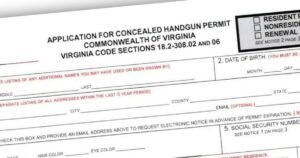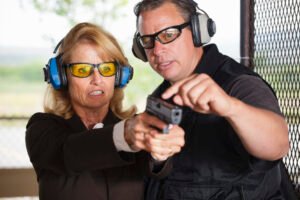Are you curious about the world of concealed carry and how to navigate it responsibly? Look no further than Concealed Carry 360 – your ultimate resource for everything related to firearm ownership and concealed carry. Whether you’re a seasoned permit holder or just starting your journey, our mission is to empower, educate, and entertain you as you delve into the world of concealed carry. From detailed breakdowns of concealed carry laws to practical tips for safe and effective carry, we offer a wide range of resources. With a diverse range of voices, real-world prep advice, and a touch of fun, Concealed Carry 360 truly has something for everyone committed to responsible gun ownership.

Introduction
Welcome to Concealed Carry 360, your ultimate resource for responsible firearm ownership and concealed carry. In this comprehensive article, we will take you through the process of obtaining your concealed carry permit, understanding the laws and regulations surrounding concealed carry, selecting the right firearm and holster, and practicing proper training and best practices.
Understanding Concealed Carry
What is concealed carry?
Concealed carry refers to the practice of carrying a concealed firearm on your person in public places. Instead of openly displaying your weapon, you keep it concealed, either on your body or in a bag or purse, to maintain a level of discretion.
Why do people choose to carry concealed?
People choose to carry concealed for various reasons. One of the main motivations is personal safety. Carrying a concealed firearm gives individuals the ability to defend themselves in potentially dangerous situations. Additionally, many people choose to carry concealed for legal protection, as it allows them to exercise their Second Amendment rights.
Benefits of Getting a Concealed Carry Permit
Increased personal safety
Obtaining a concealed carry permit can significantly increase your personal safety. In dangerous situations, having a concealed firearm allows you to protect yourself and potentially deter potential attackers. It provides an added layer of security, giving you peace of mind when out in public.
Legal protection
Having a concealed carry permit ensures that you are legally able to carry your firearm and protects you from potential legal consequences. Without a permit, carrying a concealed weapon can result in severe penalties, including fines and imprisonment. By obtaining a permit, you are demonstrating your commitment to responsible gun ownership and adherence to the law.
Ability to carry in more locations
With a concealed carry permit, you are granted the ability to carry your firearm in more locations. While each state and locality may have specific restrictions, having a permit generally allows you to carry in places such as restaurants, shopping centers, and public parks. This added flexibility ensures that you can maintain your personal safety consistently.
Understanding Concealed Carry Laws
Federal laws
While states have the primary authority to regulate concealed carry, there are some federal laws that apply nationwide. The most notable federal law is the Firearm Owners Protection Act (FOPA), which allows individuals to transport firearms across state lines as long as they are unloaded and stored in a locked container. It is crucial to familiarize yourself with these federal laws to ensure you are compliant when carrying concealed.
State laws
Each state has its own set of laws and regulations regarding concealed carry. These laws vary significantly, so it is essential to research the specific laws and requirements in your state. Some states have “shall-issue” policies, meaning they must issue permits to eligible individuals, while others have “may-issue” policies, which provide discretion to local authorities in issuing permits.
Local laws
In addition to state laws, it is vital to be aware of any local laws and ordinances that may further restrict or regulate concealed carry. Some cities and counties have specific regulations regarding carrying firearms in public places or certain events. Understanding these local laws will help you avoid legal complications and ensure you are complying with all regulations.

The Process of Obtaining a Concealed Carry Permit
Research your state’s laws and requirements
The first step in obtaining a concealed carry permit is to research your state’s laws and requirements. Visit your state’s official government website or consult reputable sources to understand the eligibility criteria, application process, and any training requirements. Familiarize yourself with the specific laws and regulations that apply in your state.
Attend a concealed carry course
Many states require applicants to complete a concealed carry course as part of the permit application process. These courses provide essential training on firearm safety, legal requirements, and situational awareness. They also offer an opportunity to practice shooting skills and gain confidence in handling a firearm. Research and enroll in a reputable concealed carry course in your area.
Submit your application
Once you have completed the necessary research and training, it is time to submit your application for a concealed carry permit. Gather all the required documents, which may include proof of residency, identification, and completion certificates from the concealed carry course. Follow the instructions provided by your state’s issuing authority and submit your application either online or in person.
Wait for approval and receive your permit
After submitting your application, you will need to wait for approval from the issuing authority. The processing time varies depending on your state, but it may take several weeks or even months. Be patient during this period, and if necessary, follow up with the issuing authority to inquire about the status of your application. Once approved, you will receive your concealed carry permit, allowing you to legally carry concealed in your state.
Choosing the Right Firearm for Concealed Carry
Consider your personal needs and preferences
When choosing a firearm for concealed carry, it is essential to consider your personal needs and preferences. Factors such as size, weight, and caliber play a significant role in determining the suitability of a firearm for carrying concealed. Additionally, consider factors such as your hand size, shooting experience, and comfort level with different firearms.
Research different types of firearms
Take the time to research different types of firearms that are commonly used for concealed carry. Consider the pros and cons of each type, such as semi-automatic pistols, revolvers, and compact or subcompact models. Look for reviews and recommendations from reputable sources and firearm experts to help inform your decision.
Visit a gun store and handle different options
Visiting a gun store and physically handling different firearms is an essential step in the decision-making process. This hands-on experience allows you to assess how each firearm feels in your hand, how easily you can manipulate the controls, and how comfortable it is to hold and shoot. Seek the assistance of knowledgeable store staff who can guide you through the selection process.
Seek professional advice
If you are still unsure about which firearm is best for you, seek professional advice from a firearms instructor or expert. They can provide personalized recommendations based on your needs, preferences, and skill level. Their expertise can help you make an informed decision and ensure that you choose a firearm that is both effective and suitable for concealed carry.

Selecting the Right Holster
Types of holsters
There are several types of holsters available for concealed carry, each with its own advantages and disadvantages. Some common types include inside-the-waistband (IWB) holsters, outside-the-waistband (OWB) holsters, ankle holsters, shoulder holsters, and pocket holsters. Research each type and consider factors such as comfort, accessibility, and concealability when selecting a holster.
Considerations for choosing the right holster
When choosing a holster, there are several factors to consider. These include the level of retention provided by the holster, the ease of drawing the firearm, the comfort and fit of the holster on your body, and the concealability of the holster under your clothing. Assess your needs and preferences to find a holster that meets your requirements and allows for safe and efficient access to your firearm.
Concealed Carry Training and Practice
The importance of regular training
Once you have obtained your concealed carry permit and selected your firearm and holster, it is crucial to prioritize regular training. Training allows you to maintain and improve your shooting skills, familiarize yourself with your firearm and holster, and practice safe and responsible gun handling techniques. Regular training ensures that you are prepared to effectively use your firearm in self-defense situations.
Finding a reputable training program
Look for reputable training programs in your area that offer concealed carry-specific training. These programs should cover topics such as firearm safety and operation, marksmanship skills, defensive shooting techniques, situational awareness, and legal considerations for self-defense. Seek recommendations from other concealed carriers, read reviews, and verify that the instructors are certified and experienced.
Practice drills and scenarios
To enhance your skills, consider practicing drills and scenarios that mimic real-world self-defense situations. This type of training helps develop muscle memory and decision-making skills under stress. Work on drawing from your holster, shooting from different positions, shooting on the move, and engaging multiple targets. Additionally, consider scenario-based training that incorporates situational awareness and decision-making into your training sessions.

Concealed Carry Best Practices
Situational awareness
Maintaining situational awareness is essential for concealed carriers. Always be aware of your surroundings and potential threats. Avoid distractions and remain attentive to changes in your environment. This heightened awareness allows you to identify potential dangers and take appropriate action to ensure your safety.
Proper firearm storage and maintenance
Ensure that you store your firearm securely and responsibly when it is not in use. Invest in a quality gun safe or lockbox to prevent unauthorized access. Regularly clean and maintain your firearm to ensure its reliable function. Proper storage and maintenance are crucial for both safety and longevity of your firearm.
Understanding use of force laws
Familiarize yourself with the use of force laws in your state. Understand the legal requirements for using your firearm in self-defense situations. It is essential to know when the use of deadly force is justified and the legal limits to avoid facing unnecessary legal consequences.
Regularly review and update your skills
As with any skill, regular practice is key to maintaining proficiency. Set aside dedicated time for range sessions and training drills. Regularly review your knowledge of firearm laws and regulations to stay up-to-date with any changes. Seek additional training opportunities to continuously improve your skills and stay prepared.
Conclusion
Obtaining your concealed carry permit and responsibly carrying a firearm is a serious decision, but it can provide increased personal safety and peace of mind. By understanding the laws and regulations, selecting the right firearm and holster, and consistently training and practicing, you can be prepared to effectively defend yourself in potentially dangerous situations. Remember to always prioritize safety and responsible gun ownership as you navigate the world of concealed carry.
